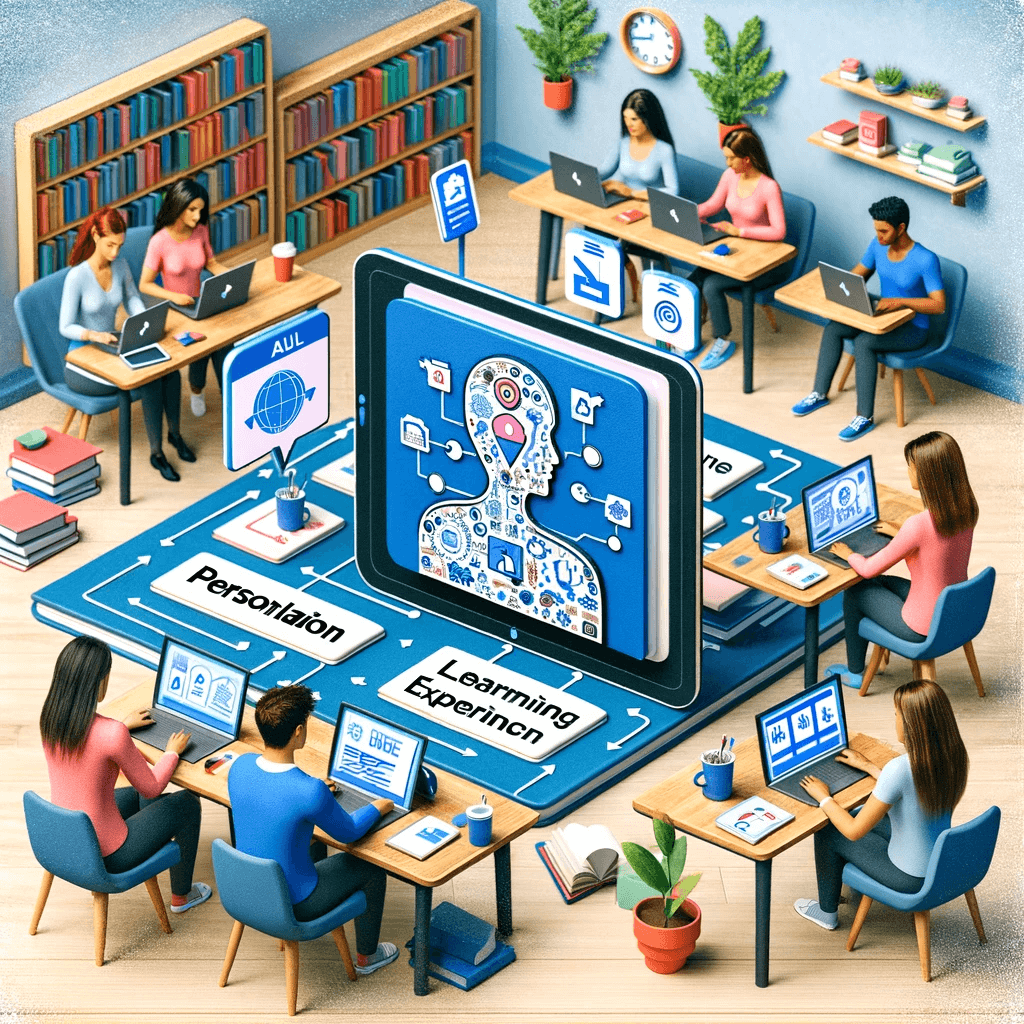In today’s dynamic educational environment, the integration of artificial intelligence (AI) has become crucial. AI has already revolutionized many industries, including online training. In this guide, we will explore the world of AI, explain its content, and explain how to effectively use it in online training. We will look at both the broad benefits and challenges of introducing AI into online training, and provide real-world examples to better understand its use.
What is artificial intelligence (AI)?
Artificial intelligence (AI) is a field of computer science that deals with creating intelligent machines that can perform tasks that normally require human intelligence. This includes processes such as learning, reasoning, problem solving, perception, and language understanding. AI imitates human thinking and actions through algorithms and computer models. It is being developed in a wide range of applications, from simple automated responses to advanced systems that can learn and adapt to changes in the environment.
The art of using AI in online training

- Customization: Designing personalized learning experiences
AI has the unique ability to analyze the behavior, preferences, and progress of participants, allowing it to tailor the learning experience to the individual. AI achieves this by:
- Content recommendations: AI algorithms suggest relevant learning materials, courses, or modules based on a participant's past activities and success, ensuring a high level of engagement for each participant.
- Flexible learning paths: The AI system adjusts the difficulty and pace of courses in real time, ensuring that participants progress at their optimal speed, aligned with their abilities.
- Customized tests: AI creates personalized tests that accurately identify individual gaps in knowledge and strengths, facilitating more effective learning strategies.
- Efficiency through automation: Transforming the learning landscape
AI simplifies various administrative and educational tasks, optimizing the efficiency of online training programs:
- Automatic evaluation: AI systems efficiently grade educators' products and assignments, relieving teachers of time-consuming manual grading while maintaining consistency in grading.
- Virtual teaching assistants: AI-powered virtual assistants serve as instant support tools, ready to answer frequently asked questions, provide guidance, and ensure participants stay on track.
- Generating content for courses: AI can play a key role in generating course content, including summaries, practice questions, and even personalized content, all in line with educational objectives.
- Raising educational outcomes
AI, with its data insights and advanced capabilities, significantly improves the overall learning experience and its outcomes:
- Predictive analytics: AI can predict participant success or potential failure, enabling early intervention and personalized support, thereby reducing dropout rates.
- Natural Language Processing (NLP): AI tools based on natural language processing accurately analyze written assignments and provide constructive feedback to participants, encouraging improvement in communication skills.
- Virtual tutors: AI-powered virtual tutors offer personalized guidance and support, complementing the role of human teachers and encouraging deeper engagement.
Using AI in Learning Management Systems (LMS)
A key aspect of incorporating AI into online training is its integration with learning management systems (LMS). LMS platforms serve as the foundation of online training, and AI enhances their capabilities in several ways:
- Improved user experience: AI-powered LMSs can provide users with intuitive, user-friendly interfaces that adapt to individual preferences, making navigation and course selection easier.
- Content curation: LMS platforms can use AI to curate and recommend relevant courses and resources, ensuring that participants have access to the most relevant materials.
- Analytics and reporting: AI-powered LMS systems can offer instructors and administrators powerful analytics and reporting tools that offer insight into participant progress and areas that may require additional attention.
- Customized learning paths: AI powered by an LMS can create personalized learning paths for each participant, suggesting courses and modules that align with their goals and areas of interest.
- Efficient administration: LMS automation can optimize administrative tasks such as enrollment, user management, and grading, reducing the administrative burden for teachers and administrators.
Potential benefits of using AI in online training
- Unparalleled customization: Participants enjoy the luxury of personalized content and support, leading to higher levels of engagement and significantly better knowledge retention.
- Efficiency of operations: Automating various tasks, including grading and administrative tasks, allows teachers to devote more time to delivering high-quality content and providing mentoring.
- Data insights: AI continuously generates a wealth of data on participant success, driving continuous improvement and adaptation of educational programs to adapt to changing needs.
- Cost-effectiveness: Automated processes and the use of virtual tutors translate into significant savings, making online training programs more cost-effective in the long run.
- Scalability: The inclusion of AI allows for the seamless expansion of training programs to accommodate the growing number of participants without compromising the quality of education.
Introducing AI into online training

While the benefits of integrating AI into online training are obvious, it is important to recognize the inherent challenges:
- Data privacy and security: Handling participant data requires strict compliance with data protection regulations and the implementation of robust security measures to protect sensitive information.
- Integration complexity: Seamlessly integrating AI systems with existing online training platforms can require technical expertise and resources.
- Adjustment period: Teachers and participants may need a transition period to adjust to the changes that AI brings to the training environment, which requires effective change management strategies.
AI – the future of online training
Integrating AI into your online training program is a big step towards driving more effective, personalized, and efficient learning experiences. While the challenges are there, the potential benefits are nothing short of incredible, demonstrating that AI is an essential tool for improving the quality of your training programs. With technology constantly advancing, embracing AI into your online training strategy is not only a smart choice, but a necessary step to stay competitive and align your offerings with the evolving needs of your learners in this digital age. The future of online training lies in AI, and it’s time for you to join that future.
Coursly AI
We recently premiered Coursly.ai. This AI-powered product is a revolutionary way to create e-courses and represents a huge leap in productivity, as it creates e-courses 250x faster and 120x cheaper as a content creator. Read more HERE.





